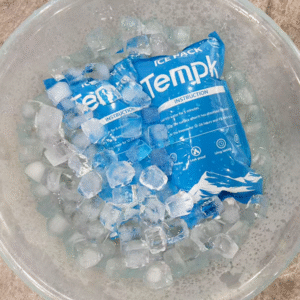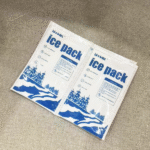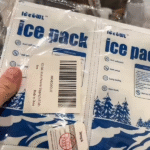Pack of 6 Dry Ice Pack Sheet: How to Ship Right?
If you ship frozen products, a pack of 6 dry ice pack sheet gives you even, wrap‑around cooling and predictable results. Used with vented packaging and solid CO₂ where needed, you can achieve 48–72 hours of frozen hold time and reduce reships. This upgraded guide merges and refines the three drafts you shared to align with 2025 on‑page SEO and cold‑chain best practices.

-
Choose correctly: When a pack of 6 dry ice pack sheet or solid CO₂ is best for your lane.
-
Size hold time: Estimate dry‑ice mass and sublimation rate per 24 hours safely.
-
Build the shipper: Pick EPS, PU, or VIP insulation for 48–72 hour deliveries.
-
Stay compliant: Mark and vent UN1845 packages the right way, every time.
-
Work efficiently: Pack faster with a 6‑sheet layout and IoT temperature loggers.
What is a pack of 6 dry ice pack sheet, exactly?
Short answer: It’s a six‑panel, flexible cooling liner you hydrate and freeze. It wraps your payload to smooth out hotspots and reduce void space. Paired with solid CO₂ (dry ice) when “still frozen” is non‑negotiable, it delivers stable cold for long lanes. The 6‑sheet format scales from small parcels to mid‑size shippers while keeping weight efficient.
Pack of 6 Dry Ice Pack
Why the term causes confusion: In market language, “dry ice pack sheet” may mean a reusable, water‑activated sheet (no hazardous classification) or a layout used with solid CO₂. In practice, shippers often combine both: the six sheets provide contact and standoff; solid CO₂ supplies ultra‑low temperature buffering.
Dry ice (UN1845) vs. “dry ice” sheets—when to use which
Use the pack of 6 dry ice pack sheet alone for chilled or short frozen hops with premium insulation. Add solid CO₂ when deep‑frozen integrity must survive heat and delay.
| Use Case | Polymer 6‑Sheet Liner | Solid CO₂ Dry Ice | What It Means for You |
|---|---|---|---|
| Frozen food 48–72 h | Helpful, but may be marginal in heat | Required for margin | Combine sheets + CO₂ for reliability |
| 2–8 °C pharma | Good fit | Usually not needed | Avoid freezing‑risk payloads |
| Ultra‑cold biologics | Not applicable | Required | Validate with dual data loggers |
Practical tips that prevent failures
-
Line all six faces with the sheet; center the payload to avoid wall heat.
-
Place dry ice above the payload; cold air falls and stabilizes corners.
-
Pre‑chill product and liners; don’t ask the coolant to “do the initial freeze.”
Real case: A meal‑kit brand replaced gel packs with a pack of 6 dry ice pack sheet plus 3 kg of dry ice in PU shippers. “Soft” delivery complaints fell 28% during peak summer.
Pack of 6 Dry Ice Pack
How does a pack of 6 dry ice pack sheet improve hold time?
Core idea: Six thin sheets create even contact and reduce thermal hotspots. That lets you use less CO₂ for the same hold time—or extend hold time with the same CO₂. With good insulation, teams routinely achieve 48–72 hours for frozen food and lab samples.
Pack of 6 Dry Ice Pack
What controls performance: insulation conductivity (PU/VIP beats EPS), ambient heat, void space, sheet coverage, and correct venting. You’ll see lower consumption (kg/24 h) when you shrink voids and use better shells.
Sizing calculator for a pack of 6 dry ice pack sheet
Use this desk‑friendly estimator, then validate with lane tests.
Example: 60 hours in summer, PU shipper:
(60/24) × 2.8 × 1.2 × 1.0 ≈ 8.4 kg CO₂. Round up and verify with two loggers.
| Insulation | Typical λ (W·m⁻¹·K⁻¹) | Starting Rate (kg/24 h) | Meaning for You |
|---|---|---|---|
| EPS | 0.03–0.045 | 3.5–4.5 | Lowest cost; increase CO₂ buffer |
| PU | 0.02–0.025 | 2.5–3.0 | Strong baseline; lighter loads |
| VIP | ~0.004–0.008 | 1.8–2.5 | Max hold; highest material cost |
User tips and quick wins
-
Shrink voids: the 6‑sheet wrap fills corners and slows warm air chimneys.
-
Ship mid‑week: reduce weekend dwell time; cut required CO₂ buffer.
-
Document two trial runs: treat your first shipments as validation.
How to build a UN1845‑compliant pack‑out with a pack of 6 dry ice pack sheet?
Short answer: Strong outer box + insulated shell + 6‑sheet liner + payload tray + dry ice in vented pockets + a lid that breathes. Mark “Dry Ice,” UN 1845, and net weight in kg; apply the Class 9 label. Train staff to keep vents open.
Pack of 6 Dry Ice Pack
-
Outer corrugate: damage‑resistant B/C‑flute.
-
Insulation: 40–60 mm EPS (budget) or 30–40 mm PU (premium) or VIP (critical).
-
Pack of 6 dry ice pack sheet: base, four walls, and lid.
-
Payload tray: center goods; maintain standoff from walls.
-
Dry ice: pellets/blocks above and around the tray, in vented sleeves.
-
Venting: never seal airtight; CO₂ must escape.
-
Marking: “Dry Ice,” “UN 1845,” net kg, shipper/recipient, Class 9 label.
UN1845 labeling checklist (print and tape near pack station)
-
☐ “Dry Ice” or “Carbon Dioxide, solid” clearly printed
-
☐ “UN 1845” + net dry ice kg
-
☐ Class 9 label (100 × 100 mm minimum)
-
☐ Shipper and recipient addresses
-
☐ Internal vents unobstructed; outer lid can breathe
For your team’s safety
-
Wear cryo gloves and eye protection.
-
Work in ventilated areas; CO₂ can displace oxygen.
-
No sealed containers; pressure damage is a real risk.
Pack of 6 Dry Ice Pack
Actual case: A lab switched to a UN1845‑compliant, six‑sheet layout with PU ships and 2.8 kg CO₂. 48‑hour enzyme deliveries held target temperature, even in peak summer.
Pack of 6 Dry Ice Pack
How to hydrate, freeze, and reuse your pack of 6 dry ice pack sheet?
Short answer: Immerse, scrunch, drain, freeze flat, then cut to fit. These reusable sheets speed pack‑outs, reduce mess, and last many cycles when handled gently.
Pack of 6 Dry Ice Pack
Step‑by‑step (SOP‑ready)
-
Hydrate: Submerge each sheet in warm water. Scrunch until every cell swells.
-
Drain: Let excess water drip off. Faster freezing, less frost.
-
Freeze flat: Aim for −20 °C for routine lanes; colder for longer holds.
-
Cut & place: Scissor between cells; cover base, walls, and lid.
-
Refreeze & rotate: Track uses; retire damaged sheets promptly.
| Step | Typical Time | Purpose | What You Gain |
|---|---|---|---|
| Hydrate & scrunch | 2–4 min/sheet | Fully expand cells | Even contact; fewer hotspots |
| Drain | 1–2 min | Reduce water mass | Faster freeze; lighter packout |
| Freeze flat | 4–8 h | Lock in capacity | Predictable, repeatable cold |
| Cut to fit | 1–2 min | Custom coverage | Less void; stable temps |
Practical safety notes
-
Never place frozen sheets or CO₂ on bare skin.
-
Store dehydrated sheets dry and away from children/pets.
-
Clean gently with mild detergent before refreezing.
Pack of 6 Dry Ice Pack
2025 trends for pack of 6 dry ice pack sheet and frozen shipping
Trend overview: Expect smarter monitoring, lighter insulation footprints, and stricter acceptance checks. A pack of 6 dry ice pack sheet remains the flexible “contact layer” in validated systems, while improved PU/VIP hybrids and real‑time BLE labels make audits faster. Sustainability programs now track CO₂e per delivery with lane‑specific pack‑outs.
Pack of 6 Dry Ice Pack
Latest progress at a glance
-
IoT thermologgers: live alerts reduce spoilage and claims.
-
Hybrid shells (PU + VIP): same hold with less dry ice.
-
Reusable liners: the 6‑sheet format cuts plastic waste across cycles.
Market insight: Food e‑commerce and specialty pharma continue to lean on dry ice for long lanes; chilled SKUs consolidate around gel packs and PCMs. Mixing strategies by SKU lowers cost without raising risk.
Pack of 6 Dry Ice Pack
FAQs
Q1: How long will a pack of 6 dry ice pack sheet keep things frozen?
With good insulation and added CO₂, plan for 48–72 hours. Validate on your lanes with two loggers.
Pack of 6 Dry Ice Pack
Q2: Can I use the sheets without solid CO₂?
Yes—for chilled or short frozen hops with premium insulation. For long, hot lanes, add CO₂.
Q3: Do UN1845 rules apply to the sheets themselves?
No. UN1845 applies to solid CO₂ (dry ice). The reusable sheets are non‑hazardous.
Pack of 6 Dry Ice Pack
Q4: How many times can I reuse the sheets?
High‑quality sheets last many cycles if you hydrate, freeze flat, and retire damaged panels. Track uses in your SOP.
Pack of 6 Dry Ice Pack
Q5: What’s a simple way to size dry ice?
Use the calculator above, then round up and test. Most small parcels consume 2.5–5.0 kg per 24 h, depending on shell and weather.
Pack of 6 Dry Ice Pack
Q6: Where should I put dry ice in the box?
Above and around the payload in vented sleeves. Cold air falls; corners stay protected.
Pack of 6 Dry Ice Pack
About Tempk
We design validated cold‑chain kits that combine pack of 6 dry ice pack sheet liners with the right insulation and monitoring. Our systems help teams ship frozen and chilled goods with fewer failures and clear SOPs. We focus on predictable performance, compliance, and practical training—so your lanes stay on‑spec in summer and winter.
Talk to our specialists for a lane‑specific pack‑out, calculator presets, and a fast pilot plan.























